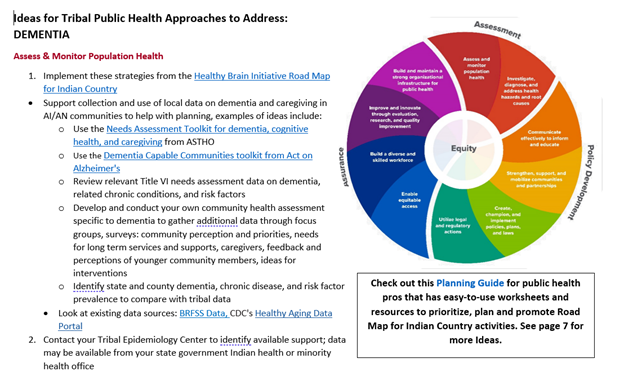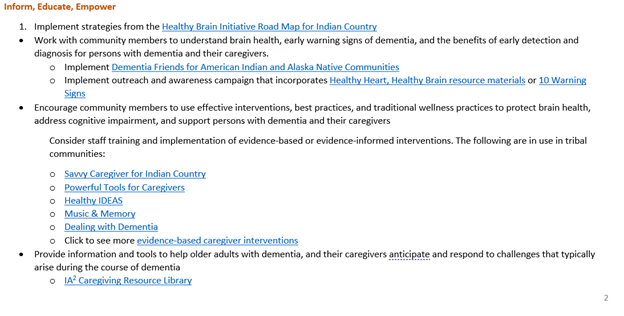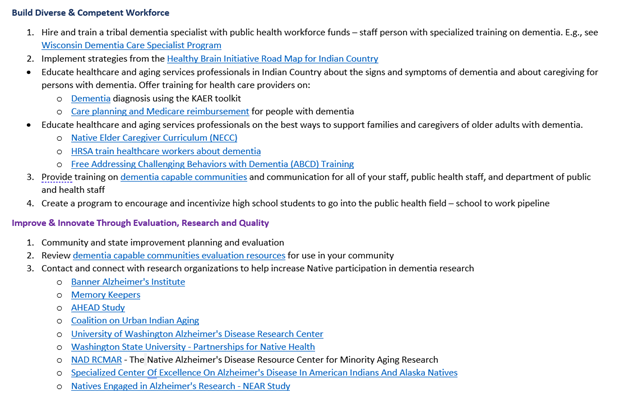This tool was created to help tribal elder service programs identify public health promotion and prevention actions they can take in their communities to address dementia and Alzheimer’s. It is based on strategies from the essential services for public health “wheel”.
Click here to download the resource: Dementia Strategies and Actions for Tribal Communities
Created under contract to the Administration for Community Living.
Ideas for Tribal Public Health Approaches to Address: DEMENTIA
Assess & Monitor Population Health
- Implement these strategies from the Healthy Brain Initiative Road Map for Indian Country
- Support collection and use of local data on dementia and caregiving in AI/AN communities to help with planning, examples of ideas include:
- Use the Needs Assessment Toolkit for dementia, cognitive health, and caregiving from ASTHO
- Use the Dementia Capable Communities toolkit from Act on Alzheimer’s
- Review relevant Title VI needs assessment data on dementia, related chronic conditions, and risk factors
- Develop and conduct your own community health assessment specific to dementia to gather additional data through focus groups, surveys: community perception and priorities, needs for long term services and supports, caregivers, feedback and perceptions of younger community members, ideas for interventions
- Identify state and county dementia, chronic disease, and risk factor prevalence to compare with tribal data
- Look at existing data sources: BRFSS Data, CDC’s Healthy Aging Data Portal
- Contact your Tribal Epidemiology Center to identify available support; data may be available from your state government Indian health or minority health offices with AI/AN communities.
Investigate, Diagnose & Address Health Issues and Root Causes
- Conduct community screening
- See the following resources for more information:
- Identify or collect data on dementia risk and protective factors from your community
- Convene a community key player group to discuss potential social, economic, and other possible causes that contribute to dementia and risk factors for dementia-specific to the tribe or villageap strategies with AI/AN communities.
Inform, Educate, Empower
- Implement strategies from the Healthy Brain Initiative Road Map for Indian Country
- Work with community members to understand brain health, early warning signs of dementia, and the benefits of early detection and diagnosis for persons with dementia and their caregivers.
- Implement Dementia Friends for American Indian and Alaska Native Communities
- Implement outreach and awareness campaign that incorporates Healthy Heart, Healthy Brain resource materials or 10 Warning Signs
- Encourage community members to use effective interventions, best practices, and traditional wellness practices to protect brain health, address cognitive impairment, and support persons with dementia and their caregivers
Consider staff training and implementation of evidence-based or evidence-informed interventions. The following are in use in tribal communities:
- Savvy Caregiver for Indian Country
- Powerful Tools for Caregivers
- Healthy IDEAS
- Music & Memory
- Dealing with Dementia
- Click to see more evidence-based caregiver interventions
- Provide information and tools to help older adults with dementia, and their caregivers anticipate and respond to challenges that typically arise during the course of dementia
- Promote engagement among tribal leaders in dementia issues by offering information and education on the basics of cognitive health and impairment, the impact of dementia on caregivers and communities, and the role of public health approaches in addressing this priority problem.
Mobilize Community Partnerships
- Review “key player” resources from the Road Map for Indian Country Planning Guide, pages 17 – 19
- Start a community advisory council, group, or board to help identify action steps for the community
- Identify partners and key key players. Consider both formal and informal partnerships and supports
- Potential Partnerships to consider (see planning guide for more ideas):
- Public health departments (tribal, county, and state) and public health staff
- Local health clinics
- Church or religious groups
- Administration for Community Living – Aging and Disability Networks
- Area Agencies on Aging
- Indian Health Services
- Schools
- Tribal Colleges
Develop & Advocate for Policies and Laws
- Seek out support and funding from tribal leadership for a Chief Dementia Health Strategist
- Find legal resources to share within the community and advocate for specific tribal regulations and resources as needed
- Advocate for regulations and resources needed to protect and promote brain health and address dementia issues
- Draft policies designed to address community-specific risk factors for dementia
- Present to the tribal council to provide an overview of dementia and suggest recommendations for tribal resolutions or policies related to dementia, including recognition of Brain Health month, formal community assessment related to dementia assessment
- Promote changes in policies, systems, and environments to improve the social and employment conditions that increase caregivers’ strain and to respond to the community’s unique cultural context
- Advocate for a tribal elders’ council (designated in tribal code or regulation) for the community if one doesn’t exist.
Enforce Laws & Regulations
- Education about current laws and regulations
- Facilitate community awareness meetings/talking circles with various entities that offer education and discussion about laws and regulations
- Support of compliance efforts and enforcement needs
Enable Equitable Access to Services & Care
- Survey or talk with the community to identify barriers to access services and care for people living with dementia and caregivers, consider:
- transportation
- accessibility of facilities (ramps, handrails, etc.)
- translations and literacy services available
- legal and financial assistance
- access to health care services and supports for people of all income levels
- access to health care coverage for specific benefits and services
- long-term care for those whose families live far away
- Create a list of health care facilities, services, and supports available in the community and nearby areas, including Indian Health Services, tribal, urban, county, and state programs.
Build Diverse & Competent Workforce
- Hire and train a tribal dementia specialist with public health workforce funds – staff person with specialized training on dementia. E.g., see Wisconsin Dementia Care Specialist Program
- Implement strategies from the Healthy Brain Initiative Road Map for Indian Country
- Educate healthcare and aging services professionals in Indian Country about the signs and symptoms of dementia and about caregiving for persons with dementia. Offer training for health care providers on:
- Dementia diagnosis using the KAER toolkit
- Care planning and Medicare reimbursement for people with dementia
- Educate healthcare and aging services professionals on the best ways to support families and caregivers of older adults with dementia.
- Provide training on dementia capable communities and communication for all of your staff, public health staff, and department of public and health staff
- Create a program to encourage and incentivize high school students to go into the public health field – school to work pipeline
Improve & Innovate Through Evaluation, Research and Quality
- Community and state improvement planning and evaluation
- Review dementia capable communities evaluation resources for use in your community
- Contact and connect with research organizations to help increase Native participation in dementia research
- Banner Alzheimer’s Institute
- Memory Keepers
- AHEAD Study
- Coalition on Urban Indian Aging
- University of Washington Alzheimer’s Disease Research Center
- Washington State University – Partnerships for Native Health
- NAD RCMAR – The Native Alzheimer’s Disease Resource Center for Minority Aging Research
- Specialized Center Of Excellence On Alzheimer’s Disease In American Indians And Alaska Natives
- Natives Engaged in Alzheimer’s Research – NEAR Study
- National Resource Center on Native American Aging
- Advocate for the inclusion of AI/AN-specific data in state and national surveillance and monitoring activities
- Ensure data collection efforts can also capture information on younger generations to assess risk and protective factors as a way to inform future public health programming
Build & Maintain Strong Public Health Infrastructure
- Hire and sustain public health workforce with special training and knowledge of aging services
- See sample job descriptions to consider for ACL Title VI Public Health Workforce grant fund opportunities
- Ongoing education and training for staff
- Coordinate healthy aging trainings for all staff
- Integrate healthy aging and caregiving support into existing health promotion and chronic disease efforts
- Dedicate staff to become subject matter experts on dementia and caregiving to serve as in-home resources
- Offer scholarships, fellowships, and internships focused on dementia and public health for high school and college students
Note: Road Map for Indian Country:
A Dissemination Guide contains quick and ready media engagement templates to help spread the word about the Road Map for Indian Country. The guide includes media templates, sample social media posts, talking points, and key facts.
A Planning Guide will help public health professionals select the Healthy Brain Initiative Road Map for Indian Country strategies to begin implementation. The guide contains easy-to-use worksheets and resources to prioritize, plan and promote Road Map strategies with AI/AN communities.



